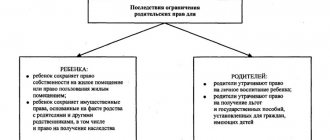3
Fulfillment by parents of the responsibilities of maintaining and raising their children is the key to society acquiring a worthy and law-abiding person in the future.
Current Russian legislation also provides for the reverse obligation of adult children to provide for their elderly parents if such a need arises after retirement or due to illness.
Alas, not every adult son agrees to voluntarily pay child support to his parents. An elderly mother and father, ignoring the needs of their son, are forced through the courts to defend their right to help from their adult offspring.
Find out more about how parents can collect child support from their children in old age.
Can I file for child support against my son?
Article 87 of the RF IC imposes the obligation to care and support parents who have lost their ability to work and need financial assistance.
Financial support for parents can be provided:
- voluntarily on the initiative of the children themselves;
- on the basis of a concluded notarized agreement;
- forcibly through collection through judicial proceedings.
The amount of financial support can be agreed upon by the parent and children, or established by the court. When determining the amount of alimony, the court takes into account the marital status of the defendant (the presence of a spouse and children), his income and expenses, as well as other circumstances that are significant and influence the outcome of the case.
The amount of monthly maintenance is determined only in a fixed amount. Establishing it as a share of all types of earnings, by analogy with interest for children, is not practiced and is not provided for by law.
The plaintiff (parent) has the right to make demands for payment of alimony against any of his children, as well as against all of them at the same time. The collection of alimony from one child in favor of a parent does not entail a similar obligation for the other. Most often, it is the son who becomes the source of additional help through the court, due to the fact that men sometimes have a higher level of income.
Concept
Alimony, both for children and for parents, is an obligation established at the level of family legislation to provide financial assistance to a parent or child in the manner and under the conditions provided for by the same legislation.
In this case, financial assistance can be expressed:
Dear readers! The article talks about typical ways to resolve legal issues, but each case is individual. If you want to find out how to solve your particular problem , contact a consultant:
+7 (499) 938-81-90 (Moscow)
+7 (812) 467-32-77 (Saint Petersburg)
8 (800) 301-79-36 (Regions)
APPLICATIONS AND CALLS ARE ACCEPTED 24/7 and 7 days a week.
It's fast and FREE !
- as in monthly maintenance payments;
- and participation in additional costs.
This obligation towards parents is contained in Articles 87-88 of the RF IC .
In what cases is alimony collected from a son in favor of his parents?
The main conditions for collecting alimony from adult children in favor of their parents are:
- parent's disability;
- parent's need for help.
The first basis is used in cases where parents reach retirement age or become disabled. To confirm these circumstances, you will definitely need an ITU certificate or a pension certificate of the claimant.
In the case of applying the second basis, the fundamental evidence is the relevant certificate of the amount of the parent’s pension and documents on expenses. Typically, the starting point for determining need is the pensioner's living wage. If the pension and other income is less than this amount, the need is considered obvious.
For example, there are often situations when a parent, after the death of his spouse, is left to live alone in an apartment, which he simply cannot pay for, due to the small size of the pension, disproportionate to the established minimum subsistence level. At the same time, children often do not consider it necessary to help their parent. As proof of expenses, you can provide paid utility bills, as well as receipts for purchased expensive medicines.
When assessing the parents' need for help, only vital needs are taken into account: food, medicine. Communal payments. Mother and father will not be able to demand their son’s help to buy a new apartment, car or trip to a sanatorium, unless the latter is a medical indication.
Execution of a court decision
After the court decision is made, the plaintiff is issued a writ of execution. It is necessary to go with him to the bailiff service to force the collection of funds from the defendant in favor of the plaintiff.
Being a parent is not only honorable, but also responsible, because you not only need to give birth to a child, but also ensure that he receives education, regular nutrition and timely medical care. That is why, even at the legislative level, parents are rewarded for fulfilling parental responsibilities by assigning a number of benefits and guarantees, which, in particular, provide for the right to alimony from children who are obliged to provide financial assistance to their parents who need help due to age or acquired disability.
When the mother and father cannot collect child support from their son
There are exceptions when parents cannot receive money from their son. In this regard, the law strictly defines two conditions:
- Children of parents who evaded the fulfillment of the duties assigned to them by law are exempt from responsibility for paying alimony. For example, if the plaintiff was at one time listed as a malicious defaulter of alimony for the maintenance of his, at that time, minor children.
- When a parent is deprived of rights in relation to children based on a court decision. Unless the parent has had their rights restored.
Bottom line
A father can still demand child support in court, although there are many nuances here. In practice, this doesn't happen often. This is due to public non-perception of such situations. It is considered the norm if parents pay child support for young children, but a father who applies to the court with a request to assign financial obligations to his offspring is perceived negatively by people. Therefore, in the vast majority of cases, parents turn directly to their children. The latter, of course, can help with money, but the regularity and amount depend on the conscience of the offspring. In any case, if you are thinking about demanding child support from your grown children, consult a lawyer first.
Additional payments for parental support
In addition to monthly maintenance, the parent has the right to involve his son in bearing additional expenses associated with his care.
For example, in situations where a parent is seriously ill and is unable to care for himself on his own, or he requires personal medical assistance (or rehabilitation) on a paid basis. In this case, it is allowed to collect additional amounts of monetary support from the parent, in addition to the fixed amount of alimony every month.
The amount of such expenses can be determined by agreement of the parties, or by the court, taking into account significant nuances, in particular the family and financial situation of the defendants.
Medical certificates, extracts from the medical history, and a parent’s rehabilitation plan will be required as supporting documents.
Conditions for submission
In addition to the fact that the parent must belong to one of the categories prescribed by law, there must also be certain conditions.
These include:
- difficult financial situation of the parent;
Extremely low income, which does not allow you to provide a minimum of benefits.
- an emergency that causes large financial expenses;
- purchasing expensive honey medications, undergoing a course of treatment, expensive surgery, etc.; for a disabled person of group III - absence for objective reasons from work in accordance with medical standards. indications and inability to find a job.
How to apply for child support for your son
An important condition for the implementation of such a right is the ability of an adult child to work. This means that children must be capable, of working age and not disabled, that is, capable of working and having sufficient income.
There are two options for parents to receive child support from their son.
- Agree to conclude an agreement through a notary. This will allow you to discuss the amount of alimony, its frequency and other conditions. With mutual agreement, this method of paying for maintenance is more convenient for both the payer and the recipient, depending on the forced collection. In this case, the parents are also protected by law, and if the son refuses to pay according to the agreement, then the document can be handed over to the bailiffs to collect the funds.
- Go to court with a claim against your son. If an adult child refuses to fulfill his obligations to his parents, all roads lead only to court. The issue of collecting alimony from parents is also considered by the magistrates' courts.
The claim is filed at the place of residence of the defendant - a good-for-nothing son who refused to help his parent. Jurisdiction at the choice of the plaintiff does not apply to such cases.
IMPORTANT: As with the collection of child support, the standard of living of the child and the parent living with him does not matter - alimony is still collected. But if it turns out that the parent has sufficient income that exceeds the income of his son, and his claims are far-fetched, his claim will be denied.
Order and procedure
The main conditions that you need to know when a parent files a claim against his son for the recovery of child support:
- The defendant (i.e., the adult child) must be an able-bodied adult citizen;
- Consideration of claims for the collection of alimony in favor of parents is carried out by magistrate courts.
- The application must be submitted at the child’s place of residence.
- If the children live in another city, then the claim can be sent by registered mail to the address of the appropriate precinct of the magistrate's court, or to the defendant's last known place of residence.
- If a parent does not know the exact place of residence of his child, then it is permissible to file a claim at the place of residence of the parent.
The procedure for considering a claim for collection of alimony from a son by a mother or father will look like this:
- Filing a claim in court and fulfilling the judge’s requirements as part of the preparation.
- Waiting for a court hearing, participating in it, or notifying the court of a hearing without your presence.
- Waiting 30 days from the date of the decision or appealing the judicial act if the outcome of the hearing does not suit the parent.
- Receiving a decision, a writ of execution and presenting it to the FSSP along with other documents: a current account for the transfer of alimony, personal documents, etc.
IMPORTANT: Failure of the plaintiff to appear in court without notice will result in the claim being left without consideration. Unless the son insists on hearing the case without the parent.
Statement of claim, content, sample
The claim for alimony recovery contains the same basic information that is specified in the general requirements for the application in Article 131 of the Code of Civil Procedure of the Russian Federation.
This:
- Name of the magistrate's precinct;
- Full name of the plaintiff, defendant, their residence addresses and registration;
- Circumstances of the case, description of disagreements regarding financial support;
- Justification of the need for alimony or additional support from the son;
- Justification of their size, calculation and arguments in favor of such an amount;
- Request for alimony;
- Personal signature and the date it was affixed.
The standard details of the application must be supplemented with an appropriate reference to the law governing child support obligations. In this case it will be a reference to Art. 87 RF IC.
In addition, the descriptive part must indicate in detail all the circumstances that prompted the parent to make such demands. You can refer to the son’s refusal to voluntarily support his parent.
The outcome of the case largely depends on the evidence presented by the plaintiff, as well as the arguments of the defendant himself.
The presented sample is universal, but you will not be able to draw up a claim on your own on the first try without qualified legal assistance. Our lawyers can advise you free of charge on all the nuances of filing and drawing up a statement of claim.
Documentation
The claim is accompanied by a package of documents confirming the stated circumstances and stated requirements.
Mandatory papers will be:
- A copy of the claim for the defendant;
- Copies of personal documents: the plaintiff’s passport, son’s birth certificate (if any) or a copy of the pages of the passport with a note about children;
- Evidence of need for assistance: certificate of pension amount; information from ITU about disability, medical statements and other documents;
- Other information confirming the plaintiff’s arguments: certificates, characteristics, account statements about the lack of movement of funds, etc.
The originals of all documents for the collection of alimony from your son must be taken to court, as the magistrate may request their provision.
Situationally, other documents may be needed, the exact composition of which can only be determined by a competent lawyer.
Price
To file a claim, you need to pay a fee of 150 rubles for the collection of alimony, established by Art. 333.19 Tax Code of the Russian Federation.
But as in the case of collecting alimony in favor of minor children, the plaintiff - mother or father, collecting alimony from their son, are subject to exemption from paying the fee.
This is stated in Art. 333.36 of the Tax Code of the Russian Federation concerns specifically alimony cases. Often, plaintiffs mistakenly use the exemption to go to court in defense of minors, believing that it is precisely for this benefit that the fee is exempted. But this is not so - any demands for the collection of monthly maintenance for children, parents or wife are exempt from paying alimony.
Additionally, you may need to pay for the work of a lawyer or advocate to draw up the claim and its representation in court. It is impossible to predict the amount of such expenses, but all of them can be recovered from the defendant-son after the claim is satisfied.
Legislative acts
In order to find out what the law dictates on the topic of alimony benefits for parents, you need to use the Family Code. First, you need to find in this source the fifth section devoted to alimony obligations of relatives, and then the thirteenth chapter, which is written specifically on the topic of financial assistance provided by parents for children, and vice versa. To specifically read about the child’s obligations to provide for the father/mother, as well as the procedure for calculating such payments, you will need to open the following articles:
-Article 87. This law fixes the whole essence of the procedure for calculating alimony support for parents who have lost their ability to work, and clearly describes when children must pay benefits, and in what cases they are exempt from this obligation, and also describes the rules for determining the amount of such payments.
-Article 88. This act establishes a number of circumstances relating to parents, in which case their children will be required to allocate additional funds required by the recipient for vital expenses. For example, these are costs associated with the treatment of serious illnesses, with the payment of an outside individual caring for the mother or father, and so on.
If children deliberately do not pay child support for a long time, and ignore all subpoenas from the court requiring them to pay the debt and warning about the imposition of punishment, then they will incur criminal liability. At best, the punishment will be correctional labor, and at worst, imprisonment.
Today in our country there are many disabled and elderly people who are on the verge of survival. After all, the size of pensions does not allow all pensioners to satisfy their most basic needs and restore their health. Therefore, let's not forget about our parents and help them, if not us, then who? The fact that not everyone receives a pension is enough to live on for a month, because... To retire, you need to buy food and medicine, and pay for utilities. LOVE AND APPRECIATE YOUR PARENTS AND DO NOT FORGET ABOUT THEM AND THEIR EXISTENCE.
Arbitrage practice
Judicial practice in this category of cases is ambiguous. In each case, the court individually examines the evidence and arguments of the plaintiff, without having a universal “template” for making decisions.
Initially, an assessment is made of the parent’s real need for help and the level of his financial support is established.
As a positive example of the practice of collecting alimony in favor of a mother from her son, one can cite the decision of the Dubovsky District Court of the Volgograd Region, No. 11-20/2011. The district court, as an appellate court, reviewed the decision of the magistrate to collect alimony in favor of the mother from her adult and able-bodied son.
At the same time, the court of second instance concluded that the plaintiff’s financial situation does not matter for the collection of alimony from children. The son, as emphasized by the court, has no other expenses for dependents and works as a director of the organization. He does not provide voluntary assistance to his mother.
The court found the decision of the magistrate to be justified and rejected the son’s complaint, leaving everything unchanged.
The decision of the Rtishchevsky District Court of the Saratov Region for No. 1-11/2017 also deserves attention.
Checking the decision of the magistrate to collect alimony in the amount of 2,500 rubles in favor of the father from his son, the court of second instance indicated that the magistrate did not take into account the defendant’s other expenses for maintaining two minor children and reduced the amount of alimony to 1,381 rubles per month.
The rest of the decision was upheld. The plaintiff's arguments about the insufficiency of the pension, equal to the subsistence level, were recognized as reliable.
But the Zheleznodorozhny District Court of Rostov-on-Don in case No. 11-82/2015, on the contrary, increased the amount of alimony, citing the high expenses of the plaintiff-parent and sufficient income of the defendant-son.
The full texts of judicial acts can be found in the Unified Bank of Judicial Decisions of the Russian Federation at bsr.sudrf.ru
As you can see, the practice of collecting alimony from a father and mother from a son is ambiguous and depends on a number of key factors:
- Income of parents and son;
- Need for help;
- The son’s expenses and his financial situation;
- Cost of living in the region.
Only an experienced lawyer can give an approximate forecast about the prospects of such a case.
Agreement on payment of alimony to parents (sample)
A voluntary agreement has a number of advantages:
- You don’t have to “interfere with the state” in your family affairs
- Eliminates the need to go through unpleasant and lengthy litigation
- Allows you to independently negotiate an amount that will satisfy both parties
- Does not require large financial costs (notarization is cheaper than legal process)
- And at the same time, the agreement has exactly the same legal force as an executive document obtained through the court (unlike oral agreements, which can be violated without any legal consequences)
You can easily draw up such an agreement yourself or find a sample on the Internet.
An experienced lawyer or notary on Prav.io will tell you what points must be recorded in this document, or tell you where it is safe to do so.
If it is not possible to conclude a voluntary agreement (usually this is due to poor relations between generations of the family and the inability to agree with each other), then the responsibility for making a decision will have to be transferred to the judicial authorities.









